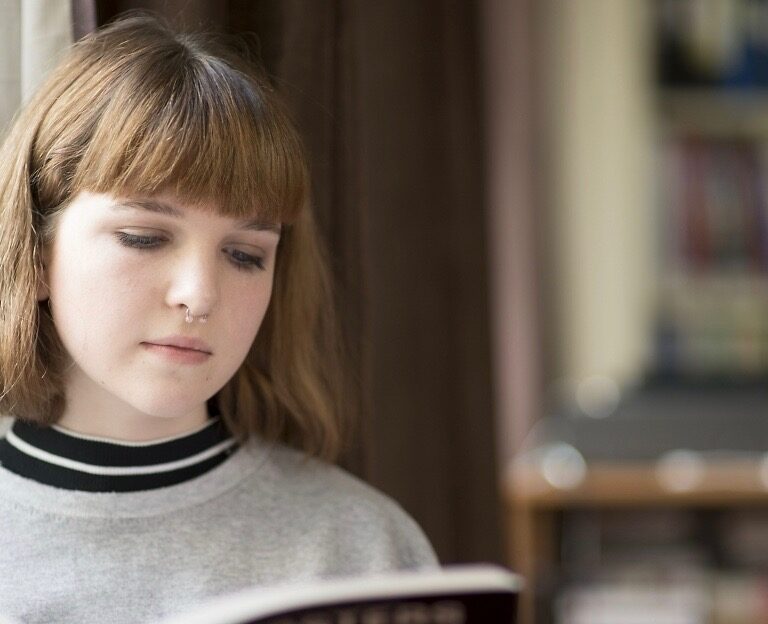English Literature is not only about the close study of written texts but is also a study of the human condition. It examines what drives us – or haunts us: loyalty, friendship, love, jealousy, fear, sorrow, ambition, greed. Students discuss how these concepts affect our lives and study how writers present and explore these ideas using the particular techniques of prose, poetry or drama. What makes a piece of writing qualify as Literature that will last? This is a question at the heart of the study of English. Broadly, the best writing adds to the debate about why we behave in the ways that we do and why the world is as it is. Class discussions include aspects of history, politics, art history, sociology and psychology and how these have inspired writers.
Through the close analysis of texts from the medieval to present day, English Literature enables students to develop strong powers of analysis and debate. The subject will strengthen students’ essay writing and develop their ability to present, structure and analyse an argument. We organise a number of visits to London’s theatres to see productions of texts being studied or to see other plays that are interesting and fun. We also take advantage of academic conferences and relevant exhibitions at venues such as the British Library, the British Museum and the V&A.
English Literature A-level is highly respected by university admissions tutors as a suitable qualification for the study of many different degree courses. Each year a number of our students go on to take English at degree level, either as a single honours course or in combination with another subject. Previous students have attended universities such as Oxford, Bristol, Nottingham, Sussex, and Kings College London. It can lead to careers in many different directions from journalism, broadcasting or advertising, to law, the City or academia.
What will I learn?
The Pearson Edexcel Level 3 Advanced GCE in English Literature consists of four components: three externally examined papers and one non-examination assessment (coursework) component. The qualification requires the study of eight literary texts plus unseen poetry.
Component 1, Drama:
Overview of content – students study:
- One Shakespeare play and one other drama from either tragedy or comedy – both texts may be selected from one or both of these categories.
- Critical essays related to their selected Shakespeare play. Students’ preparation is supported by Shakespeare: A Critical Anthology – Tragedy or Shakespeare: A Critical Anthology – Comedy.
Overview of assessment:
- Written examination, lasting 2 hours and 15 minutes.
- Open book – clean copies of the drama texts can be taken into the examination. The Critical Anthology must not be taken into the examination.
- Total of 60 marks available – 35 marks for Section A and 25 marks for Section B.
- Two sections: students answer one question from a choice of two on their studied text for both Section A and Section B.
- Section A – Shakespeare: one essay question, incorporating ideas from wider critical reading (AO1, AO2, AO3, AO5 assessed).
- Section B – Other Drama: one essay question (AO1, AO2, AO3 assessed)
Component 2, Prose:
Overview of content – students study:
- Two prose texts from a chosen theme. At least one of the prose texts must be pre-1900.
Overview of assessment:
- Written examination, lasting 1 hour and 15 minutes.
- Open book – clean copies of the prose texts can be taken into the examination.
- Total of 40 marks available.
- Students answer one comparative essay question from a choice of two on their studied theme (AO1, AO2, AO3, AO4 assessed).
Component 3, Poetry:
Overview of content – students study:
- Poetic form, meaning and language
- A selection of post-2000 specified poetry and
- A specified range of poetry from: either
- A literary period (either pre- or post-1900) or
- A named poet from within a literary period.
Overview of assessment:
- Written examination, lasting 2 hours and 15 minutes.
- Open book – clean copies of the poetry texts can be taken into the examination.
- Total of 60 marks available – 30 marks for Section A and 30 marks for Section B.
- Two sections: students answer one question from a choice of two, comparing an unseen poem with a named poem from their studied contemporary text and one question from a choice of two on their studied movement/poet.
- Section A – Post-2000 Specified Poetry: one comparative essay question on an unseen modern poem written post-2000 and one named poem from the studied contemporary text (AO1, AO2, AO4 assessed).
- Section B – Specified Poetry Pre- or Post-1900: one essay question (AO1, AO2, AO3 assessed).
Component 4, non-examination assessment:
Overview of content – students have a free choice of two texts to study.
Chosen texts:
- Must be different from those studied in Components 1, 2 and 3
- Must be complete texts and may be linked by theme, movement, author or period
- May be selected from poetry, drama, prose or literary non-fiction.
Overview of assessment:
Students produce one assignment:
- One extended comparative essay referring to two texts (AO1, AO2, AO3, AO4, AO5 assessed)
- Advisory total word count is 2500–3000 words
- Total of 60 marks available
Texts
Example of texts to be studied in 2023-2024:
Paper 1 Drama
Section A – Shakespeare, Hamlet
Section B – Other Drama, The Importance of Being Earnest
Paper 2 Prose
Home Fire
Heart of Darkness
Paper 3 Poetry
Section A – Post-2000 Poetry: Poems of the Decade
Section B – Romantic Poetry
Coursework
Last Orders by Graham Swift
The Collected Poetry of Philip Larkin.
Examination Board: EDEXCEL



